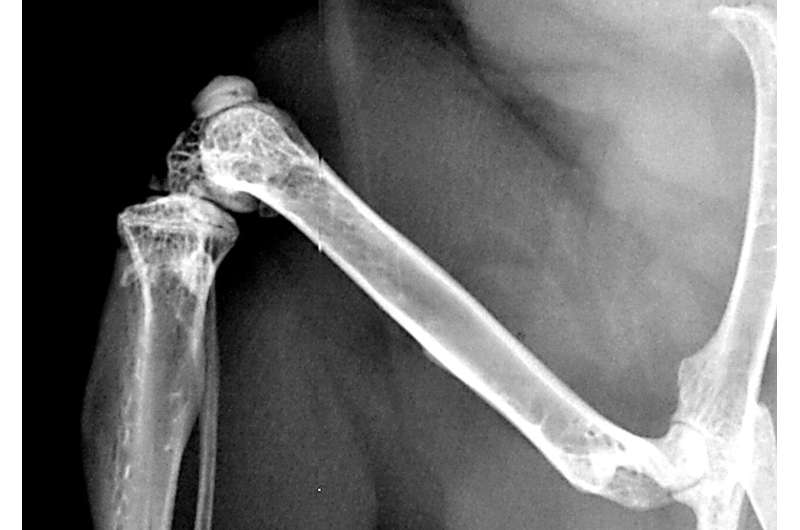This article has been reviewed according to Science X's editorial process and policies. Editors have highlighted the following attributes while ensuring the content's credibility:
fact-checked
peer-reviewed publication
proofread
Chronic stress is bad for broken bones: How psychological stress impairs bone growth and fracture healing

A study at Ulm University and its Medical Center has uncovered the molecular mechanisms by which psychological trauma and other massively stressful experiences slow down the healing of bone fractures.
The research team, which included scientists from Canada and Japan, was able to demonstrate that certain immune cells respond to stress by producing an enzyme, which in turn promotes the release of stress hormones. These stress hormones act locally on the bone where they inhibit the conversion of cartilage cells into bone cells, thus slowing down bone growth and fracture healing.
Emergency rescue workers experience massive stress, as do victims of natural disasters and acts of violence. In the event of a serious injury, this does not remain without consequences. It is already known that massively stressful and traumatic experiences slow down wound and bone healing.
Researchers at the University Medical Center Ulm have now uncovered the molecular mechanism underlying the negative effects of stress on bone metabolism and regeneration.
"A continued high mental stress load causes certain immune cells to produce an enzyme, which in turn triggers the production and release of stress hormones that compromise bone growth," said Professor Stefan Reber summing up their findings. The neurobiologist, who heads the Laboratory for Molecular Psychosomatics at the Department of Psychosomatic Medicine and Psychotherapy in Ulm, coordinated the study together with Professor Melanie Haffner-Luntzer from the Institute of Orthopaedic Research and Biomechanics. They published their work in the journal Nature Communications.
The responsible immune cells are so-called neutrophil granulocytes, which belong to the white blood cells and thus to the non-specific, innate immune system. Severe mental stress causes these immune cells to produce the enzyme tyrosine hydroxylase (TH). This enzyme then triggers the local production and release of certain stress hormones (catecholamines) in the fracture hematoma. Adrenaline is included in the group of catecholamines, as are its precursors noradrenaline and dopamine. These locally secreted stress hormones act on the areas where new bone material should be growing. In order to form new bone, cartilage cells are converted into bone cells.
"The effect of these stress hormones impairs this cartilage-to-bone transition, slowing down bone growth and fracture healing," explains Dr. Miriam Tschaffon-Müller. The scientist from the Institute of Orthopaedic Research and Biomechanics is one of the two first authors of the study, together with Elena Kempter, a doctoral researcher at Reber's lab.
With the use of cell-type-specific knockout mice with suppressed TH expression and blocked adrenoceptors, the scientists were able to reveal this stress-induced mechanism of action at the molecular genetic level. The knockout mice showed no stress-induced inhibition of bone healing. In the clinical part of the study, the researchers collaborated with the Department of Orthopaedic Trauma-, Hand-, Plastic- and Reconstruction Surgery and the Department of Psychosomatic Medicine and Psychotherapy to examine patients with ankle fractures.
"The result of the clinical study showed: when the psychological strain caused by stress, trauma or depression was considered high, patients also were characterized by high levels of tyrosine hydroxylase (TH) in the fracture hematoma, and hampered fracture healing," says Haffner-Luntzer. What is particularly astounding: the decisive factor for these measurable effects was the patients' subjective rating of the mental stress load as well as their pain perception.
The study's findings might have implications for clinical practice, giving it immediate relevance. For example, it might be advisable to consider the patients' stress or trauma history when treating fractures and other massive injuries. Under certain circumstances, it might make sense to use beta blockers to dampen the negative influence of stress hormones on bone healing.
More information: Miriam E. A. Tschaffon-Müller et al, Neutrophil-derived catecholamines mediate negative stress effects on bone, Nature Communications (2023). DOI: 10.1038/s41467-023-38616-0

















